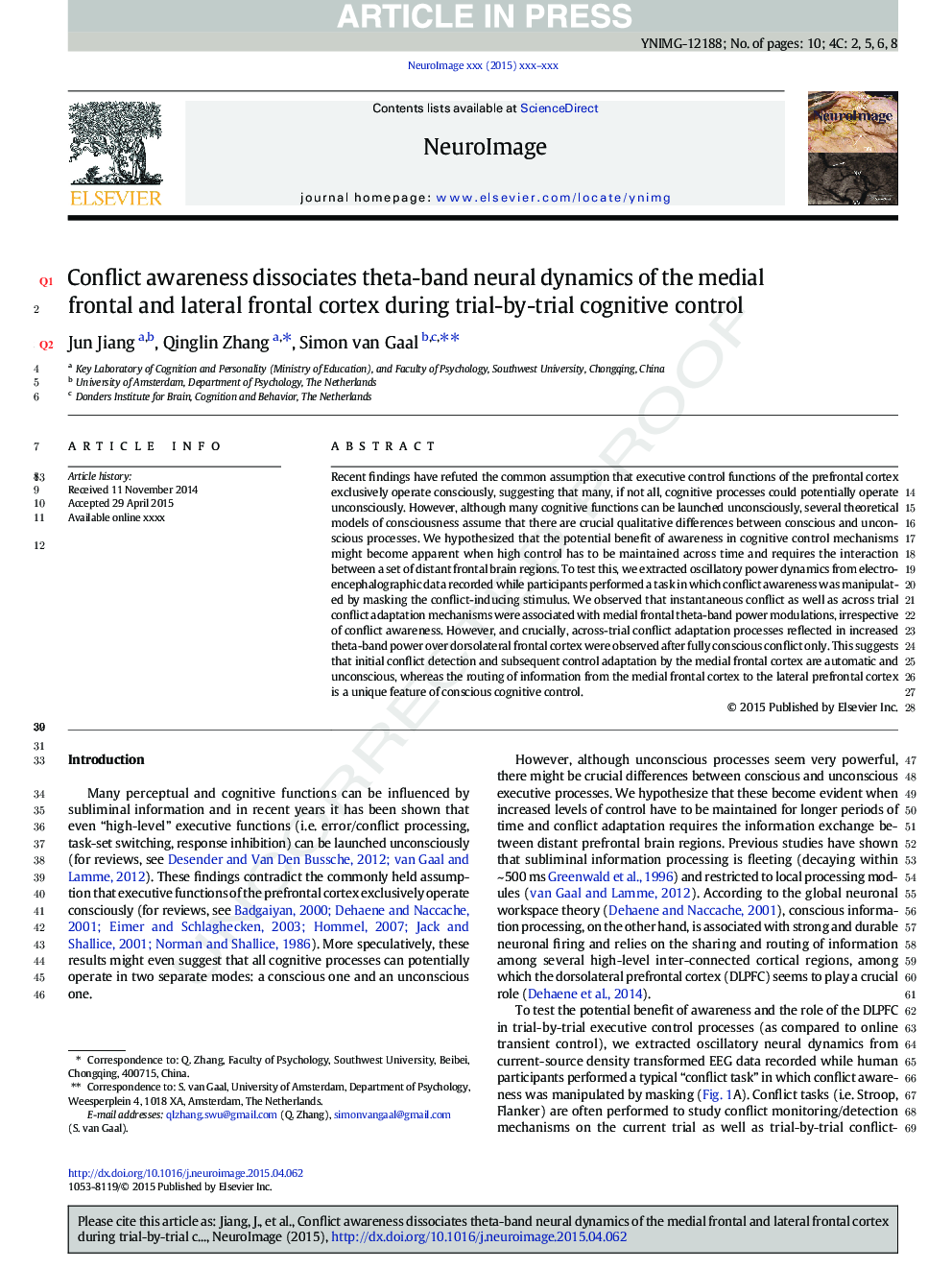| کد مقاله | کد نشریه | سال انتشار | مقاله انگلیسی | نسخه تمام متن |
|---|---|---|---|---|
| 6024887 | 1580891 | 2015 | 10 صفحه PDF | دانلود رایگان |
عنوان انگلیسی مقاله ISI
Conflict awareness dissociates theta-band neural dynamics of the medial frontal and lateral frontal cortex during trial-by-trial cognitive control
ترجمه فارسی عنوان
آگاهی از تعارض، پویایی عصبی تتا باند قشر جلویی و جانبی را در طی کنترل شناختی آزمودنی
دانلود مقاله + سفارش ترجمه
دانلود مقاله ISI انگلیسی
رایگان برای ایرانیان
ترجمه چکیده
یافته های اخیر، فرض مشترک را رد کرده اند که توابع کنترل اجرایی قشر پیشانی، منحصرا به طور آگاهانه عمل می کنند، و این نشان می دهد که بسیاری از فرآیندهای شناختی ممکن است به طور بالقوه ناخودآگاه عمل کنند. با این حال، اگر چه بسیاری از توابع شناختی را می توان ناخودآگاه راه اندازی کرد، چندین مدل نظری آگاهی فرض می کنند که تفاوت های کیفی زیادی بین فرآیندهای آگاهانه و ناخود آگاه وجود دارد. ما فرض کردیم که مزیت بالقوه آگاهی در مکانیزم های کنترل شناختی ممکن است زمانی آشکار شود که کنترل بالا بایستی در طول زمان حفظ شود و نیاز به تعامل بین مجموعه ای از مناطق مغزی دور از مغز باشد. برای آزمایش این، ما دینامیک قدرت نوسان را از داده های الکتروانسفالوگرافی ضبط کردیم، در حالی که شرکت کنندگان یک کار را انجام دادند که در آن آگاهی درگیری با دستکاری محرک های ناشی از تعارض دستکاری شد. ما مشاهده کردیم که اختلافات فوری و همچنین مکانیزم سازگاری با موانع تداخل آزمایش، بدون در نظرگرفتن آگاهی درگیری، همراه با مدولاسیون نیروی متناوب تدریجی میانی بود. با این حال، و مهمتر از همه، فرایندهای انطباق درگیری در سراسر آزمایش منعکس کننده افزایش قدرت باند تتا در برابر قشر جلویی پیشانی پس از آشکار شدن کاملا آگاهانه بود. این نشان می دهد که تشخیص ابتدایی درگیری و سازگاری کنترل بعدی توسط قشر ناحیه داخلی مدفوع اتوماتیک و ناخودآگاه است، در حالیکه انتقال اطلاعات از قشر جلویی مزوتراپی به قشر پیشانی پیشانی، ویژگی منحصر به فردی از کنترل شناختی آگاهانه است.
موضوعات مرتبط
علوم زیستی و بیوفناوری
علم عصب شناسی
علوم اعصاب شناختی
چکیده انگلیسی
Recent findings have refuted the common assumption that executive control functions of the prefrontal cortex exclusively operate consciously, suggesting that many, if not all, cognitive processes could potentially operate unconsciously. However, although many cognitive functions can be launched unconsciously, several theoretical models of consciousness assume that there are crucial qualitative differences between conscious and unconscious processes. We hypothesized that the potential benefit of awareness in cognitive control mechanisms might become apparent when high control has to be maintained across time and requires the interaction between a set of distant frontal brain regions. To test this, we extracted oscillatory power dynamics from electroencephalographic data recorded while participants performed a task in which conflict awareness was manipulated by masking the conflict-inducing stimulus. We observed that instantaneous conflict as well as across trial conflict adaptation mechanisms were associated with medial frontal theta-band power modulations, irrespective of conflict awareness. However, and crucially, across-trial conflict adaptation processes reflected in increased theta-band power over dorsolateral frontal cortex were observed after fully conscious conflict only. This suggests that initial conflict detection and subsequent control adaptation by the medial frontal cortex are automatic and unconscious, whereas the routing of information from the medial frontal cortex to the lateral prefrontal cortex is a unique feature of conscious cognitive control.
ناشر
Database: Elsevier - ScienceDirect (ساینس دایرکت)
Journal: NeuroImage - Volume 116, 1 August 2015, Pages 102-111
Journal: NeuroImage - Volume 116, 1 August 2015, Pages 102-111
نویسندگان
Jun Jiang, Qinglin Zhang, Simon van Gaal,
